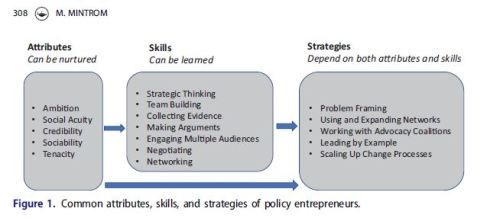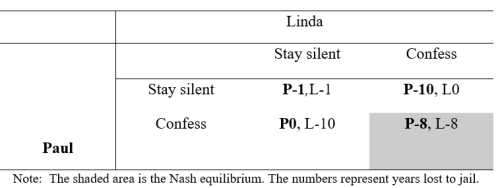This post forms one part of the Policy Analysis in 750 words series overview and connects to ‘Three habits of successful policy entrepreneurs’.
The idea of a ‘policy entrepreneur’ is important to policy studies and policy analysis.
Let’s begin with its positive role in analysis, then use policy studies to help qualify its role within policymaking environments.
The take-home-messages are to
- recognise the value of entrepreneurship, and invest in relevant skills and strategies, but
- not overstate its spread or likely impact, and
- note the unequal access to political resources associated with entrepreneurs.

Entrepreneurship and policy analysis
Mintrom identifies the intersection between policy entrepreneurship and policy analysis, to highlight the benefits of ‘positive thinking’, creativity, deliberation, and leadership.
He expands on these ideas further in So you want to be a policy entrepreneur?:
“Policy entrepreneurs are energetic actors who engage in collaborative efforts in and around government to promote policy innovations. Given the enormous challenges now facing humanity, the need is great for such actors to step forward and catalyze change processes” (Mintrom, 2019: 307).
Although many entrepreneurs seem to be exceptional people, Mintrom (2019: 308-20) identifies:
- Key attributes to compare
- ‘ambition’, to invest resources for future reward
- ‘social acuity’, to help anticipate how others are thinking
- ‘credibility’, based on authority and a good track record
- ‘sociability’, to empathise with others and form coalitions or networks
- ‘tenacity’, to persevere during adversity
- The skills that can be learned
- ‘strategic thinking’, to choose a goal and determine how to reach it
- ‘team building’, to recognise that policy change is a collective effort, not the responsibility of heroic individuals (compare with Oxfam)
- ‘collecting evidence’, and using it ‘strategically’ to frame a problem and support a solution
- ‘making arguments’, using ‘tactical argumentation’ to ‘win others to their cause and build coalitions of supporters’ (2019: 313)
- ‘engaging multiple audiences’, by tailoring arguments and evidence to their beliefs and interests
- ‘negotiating’, such as by trading your support in this case for their support in another
- ‘networking’, particularly when policymaking authority is spread across multiple venues.
- The strategies built on these attributes and skills.
- ‘problem framing’, such as to tell a story of a crisis in need of urgent attention
- ‘using and expanding networks’, to generate attention and support
- ‘working with advocacy coalitions’, to mobilise a collection of actors who already share the same beliefs
- ‘leading by example’, to signal commitment and allay fears about risk
- ‘scaling up change processes’, using policy innovation in one area to inspire wider adoption.

Overall, entrepreneurship is ‘tough work’ requiring ‘courage’, but necessary for policy disruption, by: ‘those who desire to make a difference, who recognize the enormous challenges now facing humanity, and the need for individuals to step forward and catalyze change’ (2019: 320; compare with Luetjens).
Entrepreneurship and policy studies
- Most policy actors fail
It is common to relate entrepreneurship to stories of exceptional individuals and invite people to learn from their success. However, the logical conclusion is that success is exceptional and most policy actors will fail.
A focus on key skills takes us away from this reliance on exceptional actors, and ties in with other policy studies-informed advice on how to navigate policymaking environments (see ‘Three habits of successful policy entrepreneurs’, these ANZSOG talks, and box 6.3 below)

However, note the final sentence, which reminds us that it is possible to invest a huge amount of time and effort in entrepreneurial skills without any of that investment paying off.
- Even if entrepreneurs succeed, the explanation comes more from their environments than their individual skills
The other side of the entrepreneurship coin is the policymaking environment in which actors operate.
Policy studies of entrepreneurship (such as Kingdon on multiple streams) rely heavily on metaphors on evolution. Entrepreneurs are the actors most equipped to thrive within their environments (see Room).
However, Kingdon uses the additional metaphor of ‘surfers waiting for the big wave’, which suggests that their environments are far more important than them (at least when operating on a US federal scale – see Kingdon’s Multiple Streams Approach).
Entrepreneurs may be more influential at a more local scale, but the evidence of their success (independent of the conditions in which they operate) is not overwhelming. So, self-aware entrepreneurs know when to ‘surf the waves’ or try to move the sea.
- The social background of influential actors
Many studies of entrepreneurs highlight the stories of tenacious individuals with limited resources but the burning desire to make a difference.
The alternative story is that political resources are distributed profoundly unequally. Few people have the resources to:
- run for elected office
- attend elite Universities, or find other ways to develop the kinds of personal networks that often relate to social background
- develop the credibility built on a track record in a position of authority (such as in government or science).
- be in the position to invest resources now, to secure future gains, or
- be in an influential position to exploit windows of opportunity.
Therefore, when focusing on entrepreneurial policy analysis, we should encourage the development of a suite of useful skills, but not expect equal access to that development or the same payoff from entrepreneurial action.
See also:
Compare these skills with the ones we might associate with ‘systems thinking‘
If you want to see me say these depressing things with a big grin:








